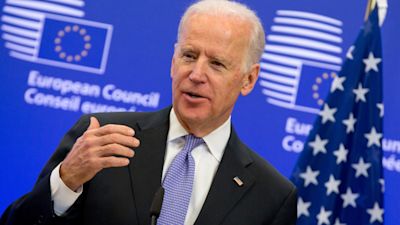Can President-elect Joe Biden really get in the way of Boris Johnson's Brexit plans?

Boris Johnson is losing a huge ally on Brexit in the White House as President Donald Trump moves out, and President-elect Joe Biden prepares to move in.
The prime minister has insisted the US will remain Britain's "closest and most important ally" but the impending arrival of Mr Biden as president is sure to alter the dynamic between the two nations.
With Mr Trump having previously labelled himself “Mr Brexit” - and his successor a known opponent of the UK leaving the EU - the president's departure could be a spanner in the works of Mr Johnson's plans.
Here is a look at the state of play of the UK’s talks with Brussels and the US in relation to the unfolding situation across the Atlantic.
– What does Joe Biden’s victory mean for a trade deal?
Mr Biden is not a natural fan of Brexit and has reservations about the Prime Minister, who he once likened to a “physical and emotional clone” of Mr Trump.
Ministers hope that talks will continue as scheduled but cannot rule out that the change in administration, which does not happen until the inauguration on January 20, will delay talks.
One key collision course with the new look White House is over the Government’s controversial UK Internal Market Bill (UKIMB), which gives ministers the power to override international law.
Mr Biden, who is proud of his Irish heritage, has been critical of the controversial legislation which seeks to make alterations to issues relating to Northern Ireland in the Withdrawal Agreement with Brussels.
Mr Biden warned that a trade deal with the US is “contingent” on the prevention of the return to a hard border on the island of Ireland and said the peace process cannot “become a casualty of Brexit”.
– What’s next for the controversial legislation?
The Bill was set for votes in the House of Lords on Monday. Many peers, including the Conservative former party leader Lord Howard, are vehemently opposed to it.
The Government is facing a potential defeat as the upper chamber tries to amend it to strip out the most-hated clauses, those which ministers admit could breach international law.
Environment Secretary George Eustice told ITV News that the Government would reinstate the clauses when the legislation returns to the Commons, though he sought to reassure Mr Biden there would be no need for a hard border.
But there has been some speculation that a defeat in the Lords could be a blessing of sorts for the Government, in giving Mr Johnson a more palatable way to climb down from the most controversial aspects of the Bill.
The Prime Minister could at that point argue those measures are no longer needed if by then a trade deal has been brokered with the EU.
But that remains a big if.
– How are negotiations with the EU?
Brussels’ chief negotiator Michel Barnier is back in London this week to resume talks with his Downing Street counterpart, Lord Frost.
No 10 has said that “significant differences” remain, with fishing policy, state subsidies and governance the key sticking points in negotiations.
The EU was also incensed by the UKIMB, and even began legal action after Mr Johnson refused to drop the legislation by the end-of-September deadline.
The Bill further soured relations, and a fallout after the European Council meeting in October briefly derailed the negotiations.
But both sides have agreed to “redouble efforts” to broker a deal.
- What is the impact of Joe Biden replacing Donald Trump?
Mr Trump, a big fan of Brexit, had often suggested he would help Britain prosper in a post-Brexit world.
His promises that the UK would be “front of the queue” when it comes to a free trade agreement with the US had given Brexit supporters confidence that the UK could replace trade with Europe with trade across the Atlantic.
If Mr Biden signals in the coming weeks that the UK is no longer front of the queue, then there may be more eagerness to win a trade deal with the EU before the end of the year.
– When will this all end?
The transition period in which the UK continues to follow EU law and remains in the single market ends on December 31.
Businesses are growing increasingly concerned that they will be subject to punishingly high trade tariffs if no trade deal with Brussels is in place by then.
But a deal-less departure by that date by no means that talk of Brexit is over, as the UK would still continue to seek trade deals with Brussels and elsewhere.
Listen to the ITV News Politics Podcast: